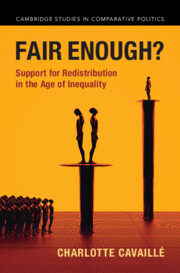Book contents
- Frontmatter
- Dedication
- Contents
- Figures
- Tables
- Acknowledgements
- 1 Demand for Redistribution in the Age of Inequality
- Part I Demand for Redistribution: A Conceptual Framework
- 2 What Is Fair?
- 3 Unpacking Demand for Redistribution
- 4 As If Self-interested? The Correlates of Fairness Beliefs
- 5 When Material Self-interest Trumps Fairness Reasoning
- Part II Changes in Demand for Redistribution
- 6 Explaining Stability and Change
- 7 Fiscal Stress and the Erosion of Social Solidarity
- 8 Partisan Dynamics and Mass Attitudinal Change
- 9 How Proportionality Beliefs Form
- 10 The Nature and Origins of Reciprocity Beliefs
- Conclusion
- References
- Index
- Cambridge Studies in Comparative Politics
3 - Unpacking Demand for Redistribution
Published online by Cambridge University Press: 07 September 2023
- Frontmatter
- Dedication
- Contents
- Figures
- Tables
- Acknowledgements
- 1 Demand for Redistribution in the Age of Inequality
- Part I Demand for Redistribution: A Conceptual Framework
- 2 What Is Fair?
- 3 Unpacking Demand for Redistribution
- 4 As If Self-interested? The Correlates of Fairness Beliefs
- 5 When Material Self-interest Trumps Fairness Reasoning
- Part II Changes in Demand for Redistribution
- 6 Explaining Stability and Change
- 7 Fiscal Stress and the Erosion of Social Solidarity
- 8 Partisan Dynamics and Mass Attitudinal Change
- 9 How Proportionality Beliefs Form
- 10 The Nature and Origins of Reciprocity Beliefs
- Conclusion
- References
- Index
- Cambridge Studies in Comparative Politics
Summary
Because people hold different empirical beliefs regarding the fairness of the status quo, they also disagree over which policies to support or oppose. This is the focus of Chapter 3. Fairness beliefs provide individuals with a mental map to interpret the world and form opinions on redistributive social policies. Because what counts as a fair allocation of market income is different from what counts as a fair allocation of social benefits, beliefs about the fairness of the former can differ from beliefs about the fairness of the latter. As a result, fairness reasoning implies a disconnect between attitudes toward policies that take market income from those who have more (e.g., predistribution and taxation policies) and attitudes toward policies that give to people who can no longer provide for themselves (e.g., generous and inclusive social insurance). As a short-hand, the first types of policies are called redistribution from policies and the second type redistribution to policies. The chapter provides a friendly horse race between existing work and the conceptualization presented in this book: The evidence overwhelmingly supports the latter.
Keywords
- Type
- Chapter
- Information
- Fair Enough?Support for Redistribution in the Age of Inequality, pp. 53 - 85Publisher: Cambridge University PressPrint publication year: 2023



